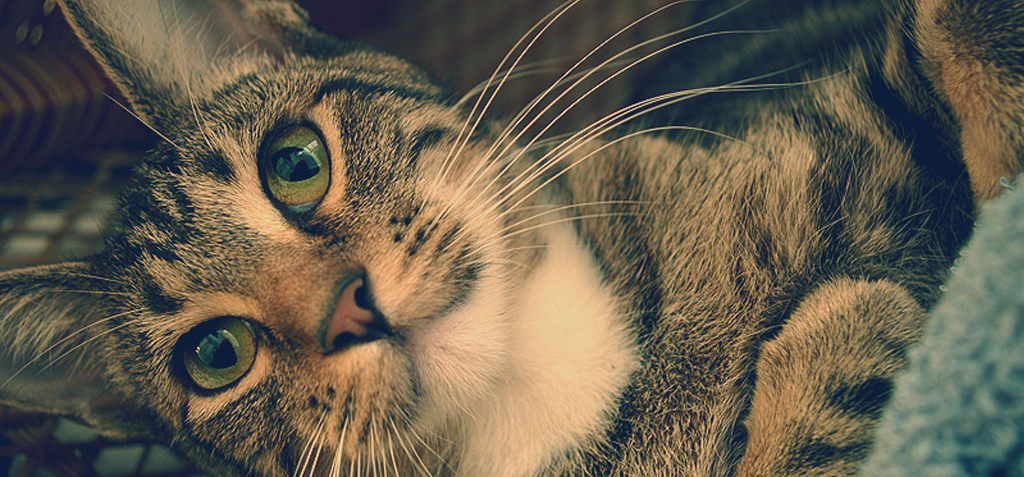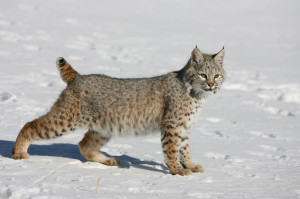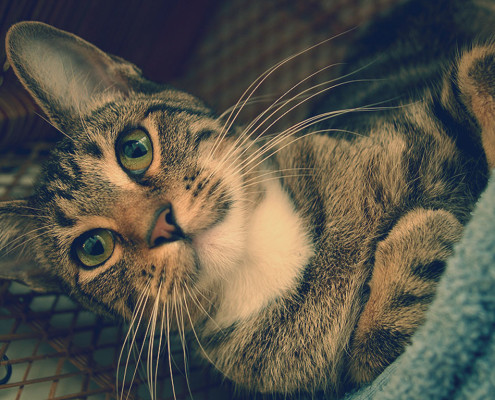Pixie-Bob

Meoww!!
Pixie Bobs are solid, muscular cats with a heavy bone structure. They take three to four years to fully mature, and grow like large breed dogs in that they go through phases where some parts grow faster than others.
In 5 Words
- highly intelligent
- social
- active
- bold
- courageous
Snapshot
Size: Large
Weight:
Male:12 to 22 pound
Females: 8 to 12 pounds
Origin: United States of America
Life Span: 13 years old in average
Colour: greys and black

Characteristics
Learn About the Pixie-Bob
The Pixie-Bob breed is believed to have started from the accidental mating of a bobcat and a barn cat in the state of Washington, which produced a female kitten named Pixie, owned by Carol Ann Brewer. Pixie became the foundation mother of the breed in 1985. (The breed’s bobcat ancestry has never been genetically proven, although it is widely believed among breeders.)
Pixie Bobs are a domestic cat breed with a resemblance to Bobcats, which originated in the Pacific Northwest region of the United States. Pixie Bobs are not genetically related to Bobcats and this has been proven via DNA testing. Bobcats were not used as breeding stock in establishing the beautiful, wonderfully personable Pixie Bob breed, and reputable Pixie Bob breeders have not (and will not) use Bobcats in their breeding programs. You may notice some Pixie Bob breeders touting their Pixie Bob cats and Pixie Bob kittens as being descended from “original Northwest lines”. Since the breed originated in the Northwest, all Pixie Bobs are descended from “original Northwest lines”.
Pixie Bobs are solid, muscular cats with a heavy bone structure. They take three to four years to fully mature, and grow like large breed dogs in that they go through phases where some parts grow faster than others. Pixie Bob females average weight is 10 to 15 pounds, while Pixie Bob males tend to be larger at an average of 12 to 18 pounds. However, these are averages and some Pixie Bob cats – both male and female – can be larger or smaller.
The Pixiebob cat breed’s temperament is outgoing, friendly cats with an almost dog-like devotion to their human family members.
Pixie Bob cats are extremely devoted to their human caretaker, so much so that they are sometimes called a ‘dog cat’ because of their strong need for companionship, attention, and affection. They can be left at home alone during the day, but pet owners need to be prepared to lavish plenty of attention on their Pixie Bob once they walk through the door.
Pixie-bobs are highly intelligent, social, active (but not hyper-active), bold, courageous, and enjoy playing with other animals.
They are also known for their “chirps”, chatters, and growls; most don’t meow often, and some don’t meow at all. Chirping is essentially their “language”, and some of their chirping actually sounds like purring.
Some Pixie-Bobs can be highly sociable around their owners and strangers, while others are highly social around their owners, but shy around strangers. Almost all Pixie-Bobs like to be in the same room as their owners, and will follow their owners around the house.
The breed has no known health problems. However, Pixie-Bobs are extremely sensitive to vaccines. It has been recommend that feeding meat in addition to commercial foods provides the nutrition these cats require to grow to their full size potential.
Breeders claim that these cats have no known breed-related inherited diseases or health problems. However, it is worth mentioning that Pixie-bobs should not receive feline leukemia or FIP vaccines, for some specialists say that these vaccinations have proved fatal to Bobs. Make sure to consult your vet and breeder before making such a vaccination.
The Pixie-bob is generally healthy, but it is always wise to buy from a breeder who provides a written health guarantee. Pixie-bobs may be fatally sensitive to certain vaccinations, so be sure to ask the breeder for her recommendations and discuss them carefully with your veterinarian.
Our Pixie Bobs are regularly veterinarian checked and inoculated. Our female breeders are not mated in back-to-back heat cycles to ensure they are in optimum health when they are mated. We do not dock our Pixie Bob kittens’ tails because we consider this to be inhumane due to the fact that kittens’ tails are nearly fully formed when they are born and this causes nerve and muscle damage.
Pixie bobs do especially well indoors. Most cats appreciate a companion pet, as well as toys, scratching posts, window shelves and lots of attention from you.
Pixie bobs are often called “doglike” because they can be trained to walk on a leash. Just watch out for areas with dogs.
Pixie-Bobs are busy but not hyperactive. They tend to develop an unusually strong bond with their families, and love to travel in the car. They are easy to train to walk on a harness, and like to fetch. They are extremely quiet with only an occasional chirp. Pixie-Bobs usually get along well with other pets.
Pixie-Bobs are known for being good with children, and are exceptionally more patient with kids than most other cats.






